Danila Dilba Indigenous Health Service: A Comprehensive Report
VerifiedAdded on 2023/06/12
|8
|2334
|449
Report
AI Summary
This report provides a comprehensive analysis of the Danila Dilba Indigenous Health Service (DDHS), an Aboriginal community-controlled organization dedicated to improving the health and well-being of Aboriginal and Torres Strait Islander people in the Darwin region. It details the history and background of DDHS, its vision and objectives, the various health services it provides (including medical, dental, and social/emotional support), and its membership structure. The report also includes personal reflections on the service's impact, particularly in addressing health inequalities and the burden of diseases like diabetes and cardiovascular issues. Furthermore, it identifies key challenges faced by DDHS, such as lack of manpower, culturally competent staff, and funding limitations. The report concludes by emphasizing the profound impact of Indigenous Health programs on improving health outcomes and life expectancy for Indigenous Australians.
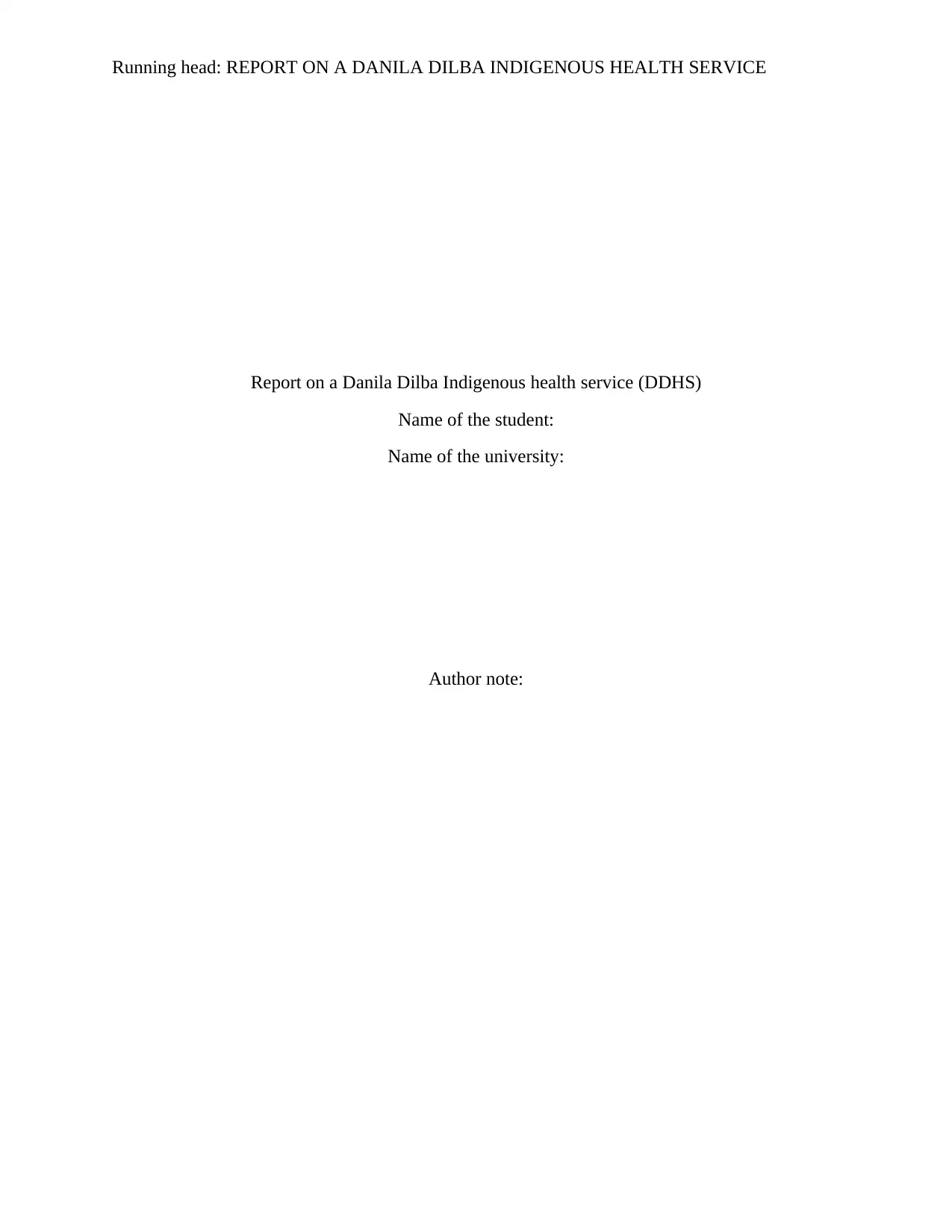
Running head: REPORT ON A DANILA DILBA INDIGENOUS HEALTH SERVICE
Report on a Danila Dilba Indigenous health service (DDHS)
Name of the student:
Name of the university:
Author note:
Report on a Danila Dilba Indigenous health service (DDHS)
Name of the student:
Name of the university:
Author note:
Paraphrase This Document
Need a fresh take? Get an instant paraphrase of this document with our AI Paraphraser
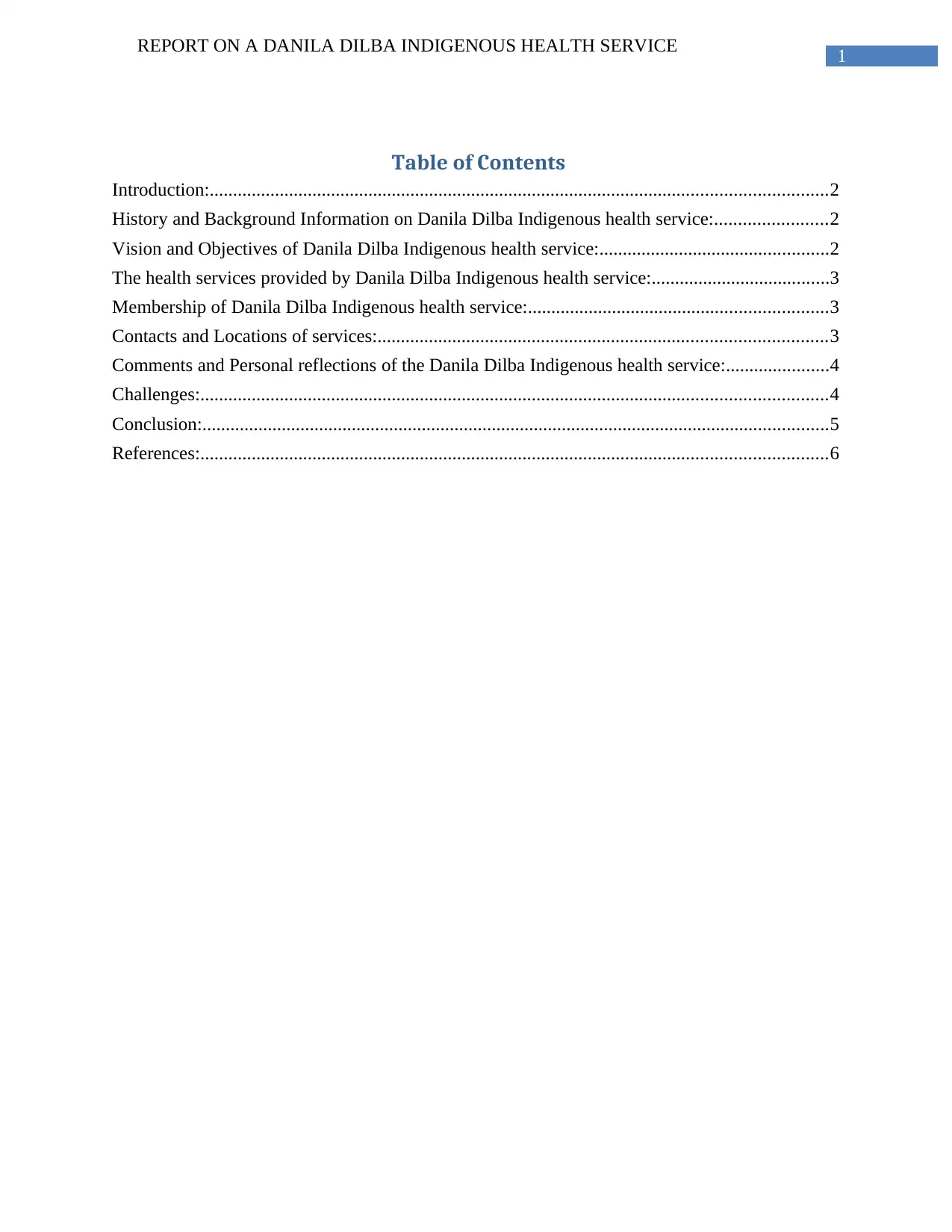
1
REPORT ON A DANILA DILBA INDIGENOUS HEALTH SERVICE
Table of Contents
Introduction:....................................................................................................................................2
History and Background Information on Danila Dilba Indigenous health service:........................2
Vision and Objectives of Danila Dilba Indigenous health service:.................................................2
The health services provided by Danila Dilba Indigenous health service:......................................3
Membership of Danila Dilba Indigenous health service:................................................................3
Contacts and Locations of services:................................................................................................3
Comments and Personal reflections of the Danila Dilba Indigenous health service:......................4
Challenges:......................................................................................................................................4
Conclusion:......................................................................................................................................5
References:......................................................................................................................................6
REPORT ON A DANILA DILBA INDIGENOUS HEALTH SERVICE
Table of Contents
Introduction:....................................................................................................................................2
History and Background Information on Danila Dilba Indigenous health service:........................2
Vision and Objectives of Danila Dilba Indigenous health service:.................................................2
The health services provided by Danila Dilba Indigenous health service:......................................3
Membership of Danila Dilba Indigenous health service:................................................................3
Contacts and Locations of services:................................................................................................3
Comments and Personal reflections of the Danila Dilba Indigenous health service:......................4
Challenges:......................................................................................................................................4
Conclusion:......................................................................................................................................5
References:......................................................................................................................................6
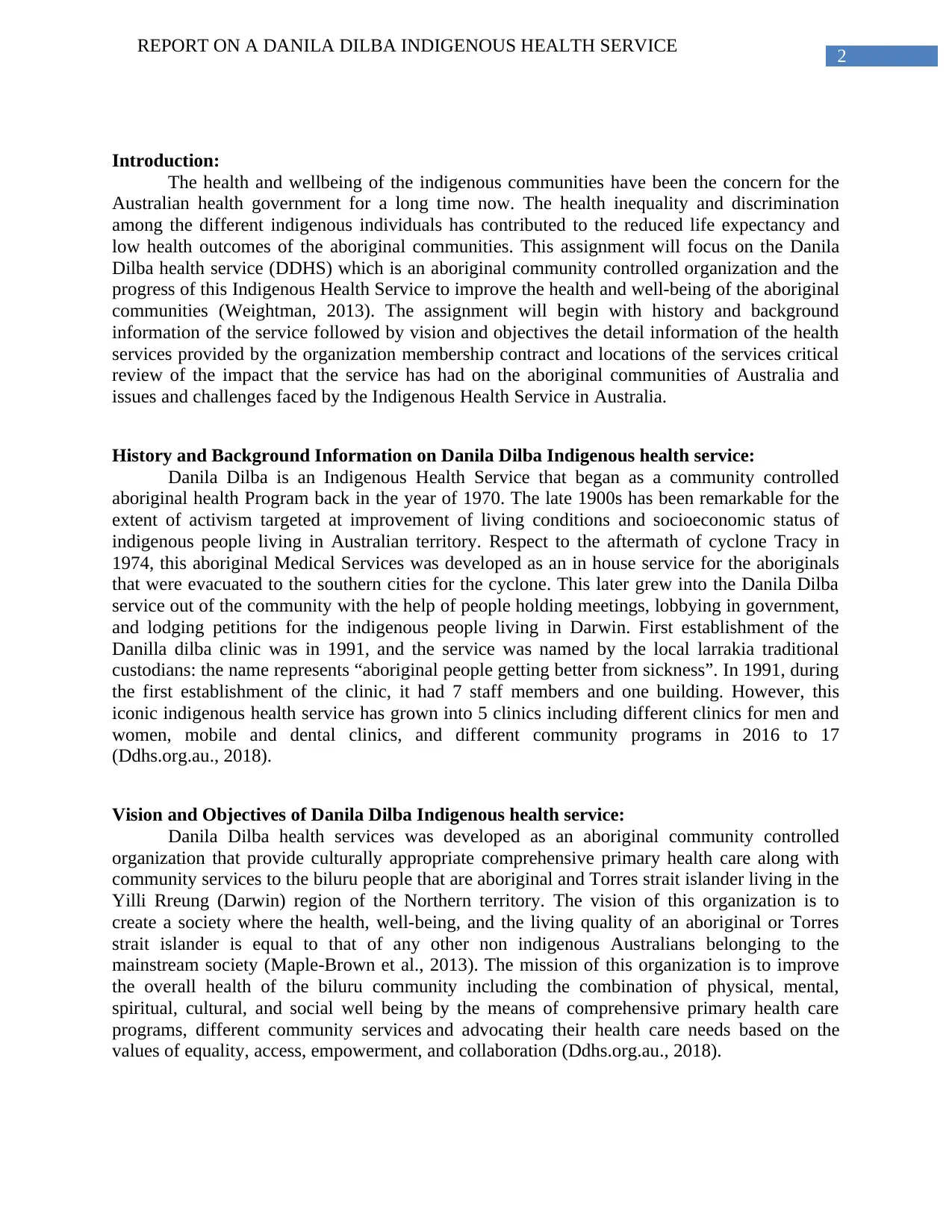
2
REPORT ON A DANILA DILBA INDIGENOUS HEALTH SERVICE
Introduction:
The health and wellbeing of the indigenous communities have been the concern for the
Australian health government for a long time now. The health inequality and discrimination
among the different indigenous individuals has contributed to the reduced life expectancy and
low health outcomes of the aboriginal communities. This assignment will focus on the Danila
Dilba health service (DDHS) which is an aboriginal community controlled organization and the
progress of this Indigenous Health Service to improve the health and well-being of the aboriginal
communities (Weightman, 2013). The assignment will begin with history and background
information of the service followed by vision and objectives the detail information of the health
services provided by the organization membership contract and locations of the services critical
review of the impact that the service has had on the aboriginal communities of Australia and
issues and challenges faced by the Indigenous Health Service in Australia.
History and Background Information on Danila Dilba Indigenous health service:
Danila Dilba is an Indigenous Health Service that began as a community controlled
aboriginal health Program back in the year of 1970. The late 1900s has been remarkable for the
extent of activism targeted at improvement of living conditions and socioeconomic status of
indigenous people living in Australian territory. Respect to the aftermath of cyclone Tracy in
1974, this aboriginal Medical Services was developed as an in house service for the aboriginals
that were evacuated to the southern cities for the cyclone. This later grew into the Danila Dilba
service out of the community with the help of people holding meetings, lobbying in government,
and lodging petitions for the indigenous people living in Darwin. First establishment of the
Danilla dilba clinic was in 1991, and the service was named by the local larrakia traditional
custodians: the name represents “aboriginal people getting better from sickness”. In 1991, during
the first establishment of the clinic, it had 7 staff members and one building. However, this
iconic indigenous health service has grown into 5 clinics including different clinics for men and
women, mobile and dental clinics, and different community programs in 2016 to 17
(Ddhs.org.au., 2018).
Vision and Objectives of Danila Dilba Indigenous health service:
Danila Dilba health services was developed as an aboriginal community controlled
organization that provide culturally appropriate comprehensive primary health care along with
community services to the biluru people that are aboriginal and Torres strait islander living in the
Yilli Rreung (Darwin) region of the Northern territory. The vision of this organization is to
create a society where the health, well-being, and the living quality of an aboriginal or Torres
strait islander is equal to that of any other non indigenous Australians belonging to the
mainstream society (Maple-Brown et al., 2013). The mission of this organization is to improve
the overall health of the biluru community including the combination of physical, mental,
spiritual, cultural, and social well being by the means of comprehensive primary health care
programs, different community services and advocating their health care needs based on the
values of equality, access, empowerment, and collaboration (Ddhs.org.au., 2018).
REPORT ON A DANILA DILBA INDIGENOUS HEALTH SERVICE
Introduction:
The health and wellbeing of the indigenous communities have been the concern for the
Australian health government for a long time now. The health inequality and discrimination
among the different indigenous individuals has contributed to the reduced life expectancy and
low health outcomes of the aboriginal communities. This assignment will focus on the Danila
Dilba health service (DDHS) which is an aboriginal community controlled organization and the
progress of this Indigenous Health Service to improve the health and well-being of the aboriginal
communities (Weightman, 2013). The assignment will begin with history and background
information of the service followed by vision and objectives the detail information of the health
services provided by the organization membership contract and locations of the services critical
review of the impact that the service has had on the aboriginal communities of Australia and
issues and challenges faced by the Indigenous Health Service in Australia.
History and Background Information on Danila Dilba Indigenous health service:
Danila Dilba is an Indigenous Health Service that began as a community controlled
aboriginal health Program back in the year of 1970. The late 1900s has been remarkable for the
extent of activism targeted at improvement of living conditions and socioeconomic status of
indigenous people living in Australian territory. Respect to the aftermath of cyclone Tracy in
1974, this aboriginal Medical Services was developed as an in house service for the aboriginals
that were evacuated to the southern cities for the cyclone. This later grew into the Danila Dilba
service out of the community with the help of people holding meetings, lobbying in government,
and lodging petitions for the indigenous people living in Darwin. First establishment of the
Danilla dilba clinic was in 1991, and the service was named by the local larrakia traditional
custodians: the name represents “aboriginal people getting better from sickness”. In 1991, during
the first establishment of the clinic, it had 7 staff members and one building. However, this
iconic indigenous health service has grown into 5 clinics including different clinics for men and
women, mobile and dental clinics, and different community programs in 2016 to 17
(Ddhs.org.au., 2018).
Vision and Objectives of Danila Dilba Indigenous health service:
Danila Dilba health services was developed as an aboriginal community controlled
organization that provide culturally appropriate comprehensive primary health care along with
community services to the biluru people that are aboriginal and Torres strait islander living in the
Yilli Rreung (Darwin) region of the Northern territory. The vision of this organization is to
create a society where the health, well-being, and the living quality of an aboriginal or Torres
strait islander is equal to that of any other non indigenous Australians belonging to the
mainstream society (Maple-Brown et al., 2013). The mission of this organization is to improve
the overall health of the biluru community including the combination of physical, mental,
spiritual, cultural, and social well being by the means of comprehensive primary health care
programs, different community services and advocating their health care needs based on the
values of equality, access, empowerment, and collaboration (Ddhs.org.au., 2018).
⊘ This is a preview!⊘
Do you want full access?
Subscribe today to unlock all pages.

Trusted by 1+ million students worldwide
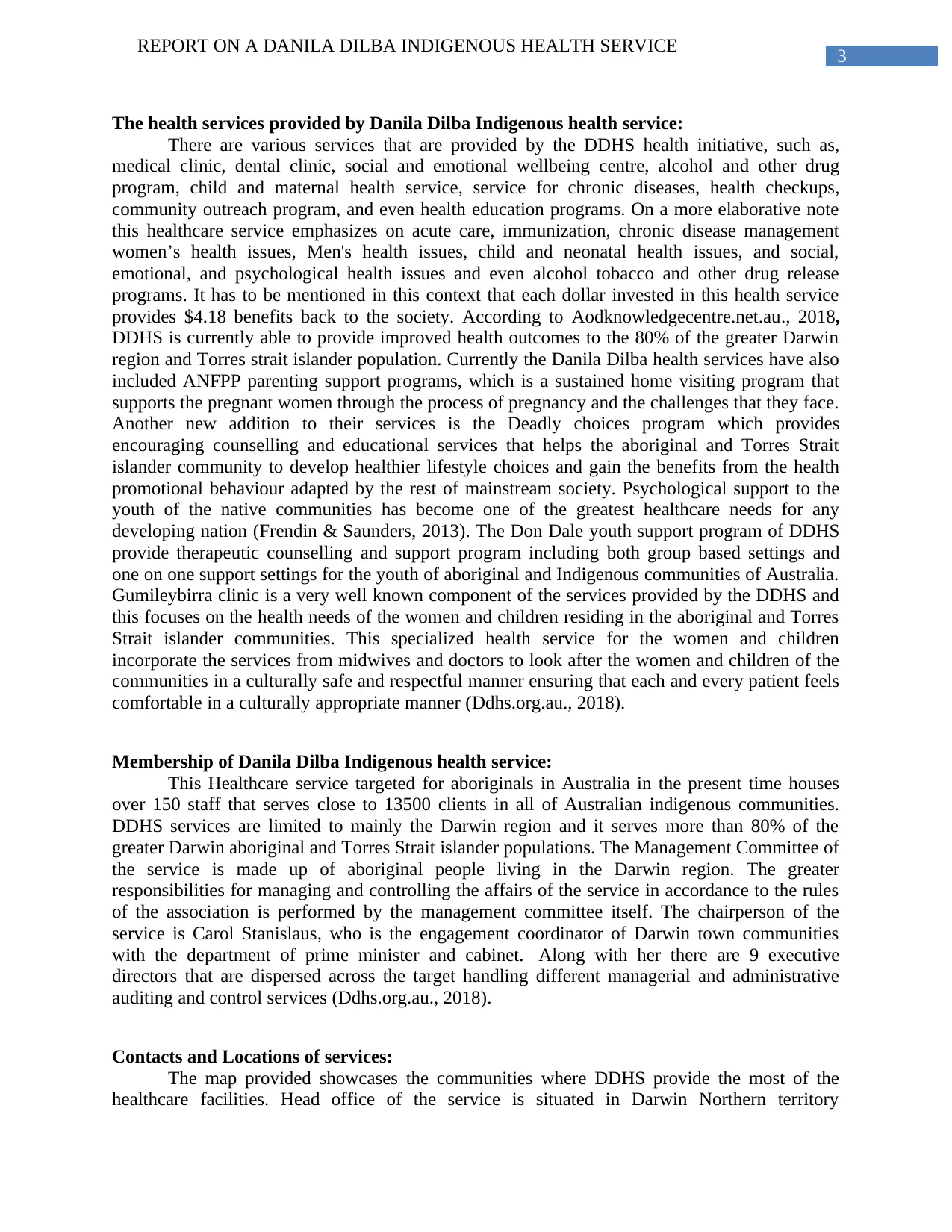
3
REPORT ON A DANILA DILBA INDIGENOUS HEALTH SERVICE
The health services provided by Danila Dilba Indigenous health service:
There are various services that are provided by the DDHS health initiative, such as,
medical clinic, dental clinic, social and emotional wellbeing centre, alcohol and other drug
program, child and maternal health service, service for chronic diseases, health checkups,
community outreach program, and even health education programs. On a more elaborative note
this healthcare service emphasizes on acute care, immunization, chronic disease management
women’s health issues, Men's health issues, child and neonatal health issues, and social,
emotional, and psychological health issues and even alcohol tobacco and other drug release
programs. It has to be mentioned in this context that each dollar invested in this health service
provides $4.18 benefits back to the society. According to Aodknowledgecentre.net.au., 2018,
DDHS is currently able to provide improved health outcomes to the 80% of the greater Darwin
region and Torres strait islander population. Currently the Danila Dilba health services have also
included ANFPP parenting support programs, which is a sustained home visiting program that
supports the pregnant women through the process of pregnancy and the challenges that they face.
Another new addition to their services is the Deadly choices program which provides
encouraging counselling and educational services that helps the aboriginal and Torres Strait
islander community to develop healthier lifestyle choices and gain the benefits from the health
promotional behaviour adapted by the rest of mainstream society. Psychological support to the
youth of the native communities has become one of the greatest healthcare needs for any
developing nation (Frendin & Saunders, 2013). The Don Dale youth support program of DDHS
provide therapeutic counselling and support program including both group based settings and
one on one support settings for the youth of aboriginal and Indigenous communities of Australia.
Gumileybirra clinic is a very well known component of the services provided by the DDHS and
this focuses on the health needs of the women and children residing in the aboriginal and Torres
Strait islander communities. This specialized health service for the women and children
incorporate the services from midwives and doctors to look after the women and children of the
communities in a culturally safe and respectful manner ensuring that each and every patient feels
comfortable in a culturally appropriate manner (Ddhs.org.au., 2018).
Membership of Danila Dilba Indigenous health service:
This Healthcare service targeted for aboriginals in Australia in the present time houses
over 150 staff that serves close to 13500 clients in all of Australian indigenous communities.
DDHS services are limited to mainly the Darwin region and it serves more than 80% of the
greater Darwin aboriginal and Torres Strait islander populations. The Management Committee of
the service is made up of aboriginal people living in the Darwin region. The greater
responsibilities for managing and controlling the affairs of the service in accordance to the rules
of the association is performed by the management committee itself. The chairperson of the
service is Carol Stanislaus, who is the engagement coordinator of Darwin town communities
with the department of prime minister and cabinet. Along with her there are 9 executive
directors that are dispersed across the target handling different managerial and administrative
auditing and control services (Ddhs.org.au., 2018).
Contacts and Locations of services:
The map provided showcases the communities where DDHS provide the most of the
healthcare facilities. Head office of the service is situated in Darwin Northern territory
REPORT ON A DANILA DILBA INDIGENOUS HEALTH SERVICE
The health services provided by Danila Dilba Indigenous health service:
There are various services that are provided by the DDHS health initiative, such as,
medical clinic, dental clinic, social and emotional wellbeing centre, alcohol and other drug
program, child and maternal health service, service for chronic diseases, health checkups,
community outreach program, and even health education programs. On a more elaborative note
this healthcare service emphasizes on acute care, immunization, chronic disease management
women’s health issues, Men's health issues, child and neonatal health issues, and social,
emotional, and psychological health issues and even alcohol tobacco and other drug release
programs. It has to be mentioned in this context that each dollar invested in this health service
provides $4.18 benefits back to the society. According to Aodknowledgecentre.net.au., 2018,
DDHS is currently able to provide improved health outcomes to the 80% of the greater Darwin
region and Torres strait islander population. Currently the Danila Dilba health services have also
included ANFPP parenting support programs, which is a sustained home visiting program that
supports the pregnant women through the process of pregnancy and the challenges that they face.
Another new addition to their services is the Deadly choices program which provides
encouraging counselling and educational services that helps the aboriginal and Torres Strait
islander community to develop healthier lifestyle choices and gain the benefits from the health
promotional behaviour adapted by the rest of mainstream society. Psychological support to the
youth of the native communities has become one of the greatest healthcare needs for any
developing nation (Frendin & Saunders, 2013). The Don Dale youth support program of DDHS
provide therapeutic counselling and support program including both group based settings and
one on one support settings for the youth of aboriginal and Indigenous communities of Australia.
Gumileybirra clinic is a very well known component of the services provided by the DDHS and
this focuses on the health needs of the women and children residing in the aboriginal and Torres
Strait islander communities. This specialized health service for the women and children
incorporate the services from midwives and doctors to look after the women and children of the
communities in a culturally safe and respectful manner ensuring that each and every patient feels
comfortable in a culturally appropriate manner (Ddhs.org.au., 2018).
Membership of Danila Dilba Indigenous health service:
This Healthcare service targeted for aboriginals in Australia in the present time houses
over 150 staff that serves close to 13500 clients in all of Australian indigenous communities.
DDHS services are limited to mainly the Darwin region and it serves more than 80% of the
greater Darwin aboriginal and Torres Strait islander populations. The Management Committee of
the service is made up of aboriginal people living in the Darwin region. The greater
responsibilities for managing and controlling the affairs of the service in accordance to the rules
of the association is performed by the management committee itself. The chairperson of the
service is Carol Stanislaus, who is the engagement coordinator of Darwin town communities
with the department of prime minister and cabinet. Along with her there are 9 executive
directors that are dispersed across the target handling different managerial and administrative
auditing and control services (Ddhs.org.au., 2018).
Contacts and Locations of services:
The map provided showcases the communities where DDHS provide the most of the
healthcare facilities. Head office of the service is situated in Darwin Northern territory
Paraphrase This Document
Need a fresh take? Get an instant paraphrase of this document with our AI Paraphraser
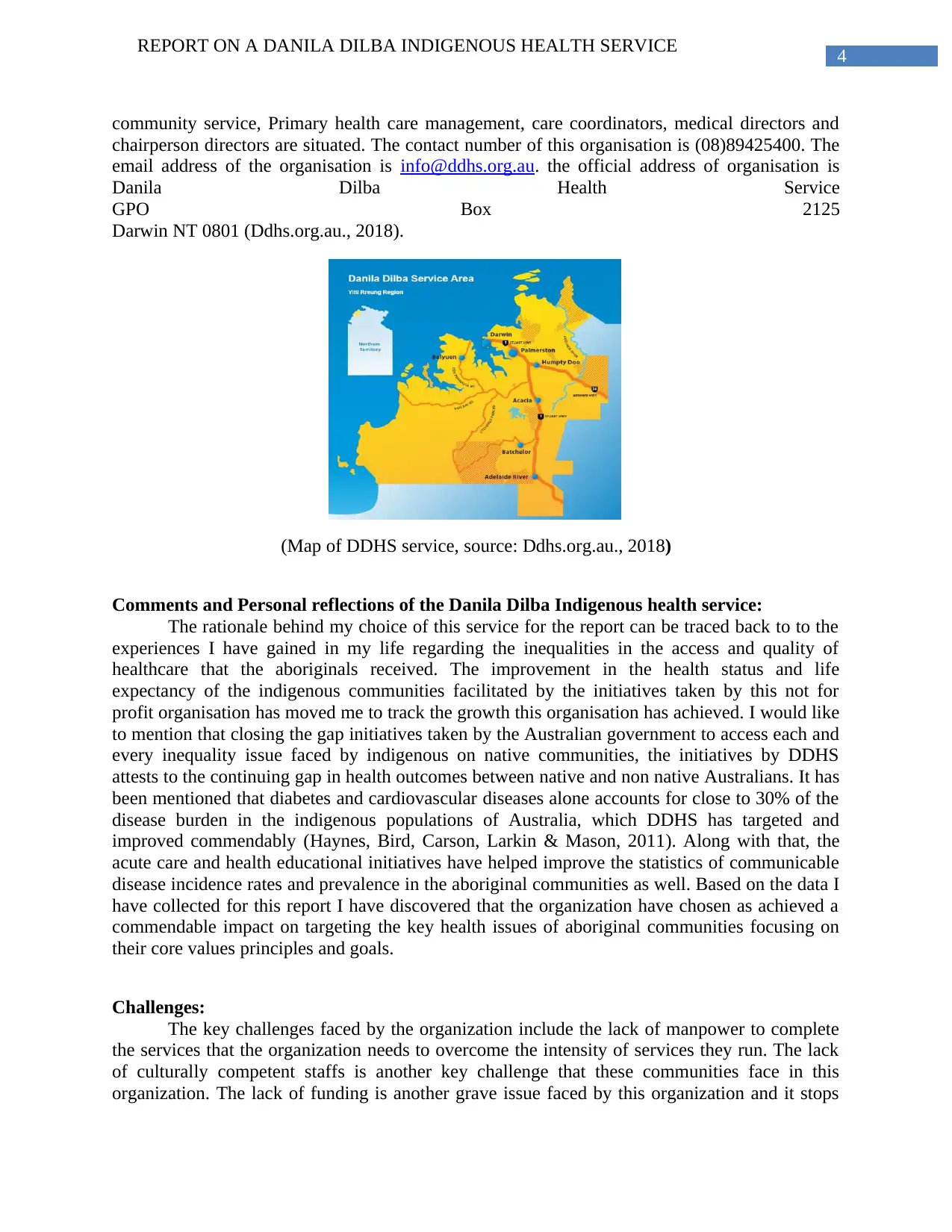
4
REPORT ON A DANILA DILBA INDIGENOUS HEALTH SERVICE
community service, Primary health care management, care coordinators, medical directors and
chairperson directors are situated. The contact number of this organisation is (08)89425400. The
email address of the organisation is info@ddhs.org.au. the official address of organisation is
Danila Dilba Health Service
GPO Box 2125
Darwin NT 0801 (Ddhs.org.au., 2018).
(Map of DDHS service, source: Ddhs.org.au., 2018)
Comments and Personal reflections of the Danila Dilba Indigenous health service:
The rationale behind my choice of this service for the report can be traced back to to the
experiences I have gained in my life regarding the inequalities in the access and quality of
healthcare that the aboriginals received. The improvement in the health status and life
expectancy of the indigenous communities facilitated by the initiatives taken by this not for
profit organisation has moved me to track the growth this organisation has achieved. I would like
to mention that closing the gap initiatives taken by the Australian government to access each and
every inequality issue faced by indigenous on native communities, the initiatives by DDHS
attests to the continuing gap in health outcomes between native and non native Australians. It has
been mentioned that diabetes and cardiovascular diseases alone accounts for close to 30% of the
disease burden in the indigenous populations of Australia, which DDHS has targeted and
improved commendably (Haynes, Bird, Carson, Larkin & Mason, 2011). Along with that, the
acute care and health educational initiatives have helped improve the statistics of communicable
disease incidence rates and prevalence in the aboriginal communities as well. Based on the data I
have collected for this report I have discovered that the organization have chosen as achieved a
commendable impact on targeting the key health issues of aboriginal communities focusing on
their core values principles and goals.
Challenges:
The key challenges faced by the organization include the lack of manpower to complete
the services that the organization needs to overcome the intensity of services they run. The lack
of culturally competent staffs is another key challenge that these communities face in this
organization. The lack of funding is another grave issue faced by this organization and it stops
REPORT ON A DANILA DILBA INDIGENOUS HEALTH SERVICE
community service, Primary health care management, care coordinators, medical directors and
chairperson directors are situated. The contact number of this organisation is (08)89425400. The
email address of the organisation is info@ddhs.org.au. the official address of organisation is
Danila Dilba Health Service
GPO Box 2125
Darwin NT 0801 (Ddhs.org.au., 2018).
(Map of DDHS service, source: Ddhs.org.au., 2018)
Comments and Personal reflections of the Danila Dilba Indigenous health service:
The rationale behind my choice of this service for the report can be traced back to to the
experiences I have gained in my life regarding the inequalities in the access and quality of
healthcare that the aboriginals received. The improvement in the health status and life
expectancy of the indigenous communities facilitated by the initiatives taken by this not for
profit organisation has moved me to track the growth this organisation has achieved. I would like
to mention that closing the gap initiatives taken by the Australian government to access each and
every inequality issue faced by indigenous on native communities, the initiatives by DDHS
attests to the continuing gap in health outcomes between native and non native Australians. It has
been mentioned that diabetes and cardiovascular diseases alone accounts for close to 30% of the
disease burden in the indigenous populations of Australia, which DDHS has targeted and
improved commendably (Haynes, Bird, Carson, Larkin & Mason, 2011). Along with that, the
acute care and health educational initiatives have helped improve the statistics of communicable
disease incidence rates and prevalence in the aboriginal communities as well. Based on the data I
have collected for this report I have discovered that the organization have chosen as achieved a
commendable impact on targeting the key health issues of aboriginal communities focusing on
their core values principles and goals.
Challenges:
The key challenges faced by the organization include the lack of manpower to complete
the services that the organization needs to overcome the intensity of services they run. The lack
of culturally competent staffs is another key challenge that these communities face in this
organization. The lack of funding is another grave issue faced by this organization and it stops
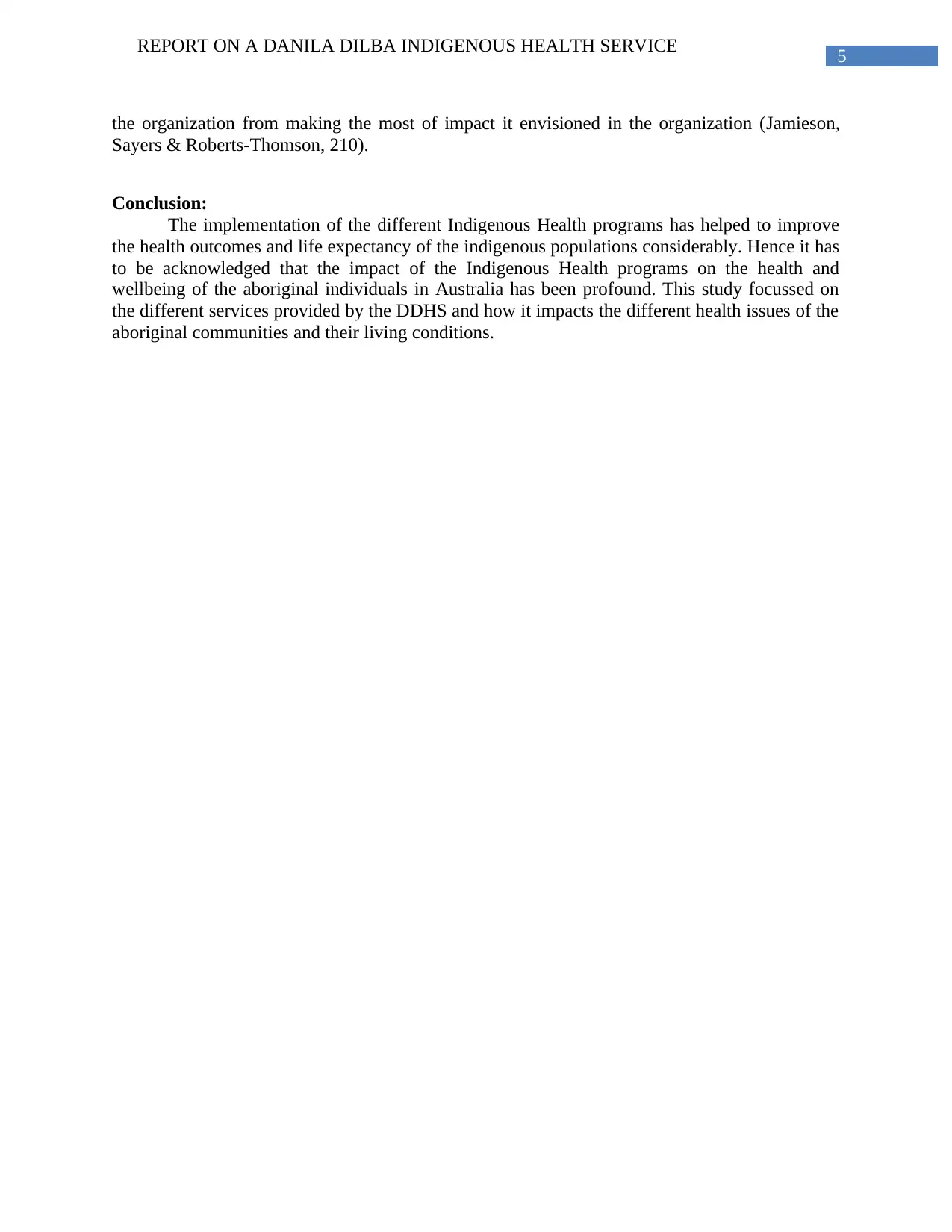
5
REPORT ON A DANILA DILBA INDIGENOUS HEALTH SERVICE
the organization from making the most of impact it envisioned in the organization (Jamieson,
Sayers & Roberts-Thomson, 210).
Conclusion:
The implementation of the different Indigenous Health programs has helped to improve
the health outcomes and life expectancy of the indigenous populations considerably. Hence it has
to be acknowledged that the impact of the Indigenous Health programs on the health and
wellbeing of the aboriginal individuals in Australia has been profound. This study focussed on
the different services provided by the DDHS and how it impacts the different health issues of the
aboriginal communities and their living conditions.
REPORT ON A DANILA DILBA INDIGENOUS HEALTH SERVICE
the organization from making the most of impact it envisioned in the organization (Jamieson,
Sayers & Roberts-Thomson, 210).
Conclusion:
The implementation of the different Indigenous Health programs has helped to improve
the health outcomes and life expectancy of the indigenous populations considerably. Hence it has
to be acknowledged that the impact of the Indigenous Health programs on the health and
wellbeing of the aboriginal individuals in Australia has been profound. This study focussed on
the different services provided by the DDHS and how it impacts the different health issues of the
aboriginal communities and their living conditions.
⊘ This is a preview!⊘
Do you want full access?
Subscribe today to unlock all pages.

Trusted by 1+ million students worldwide
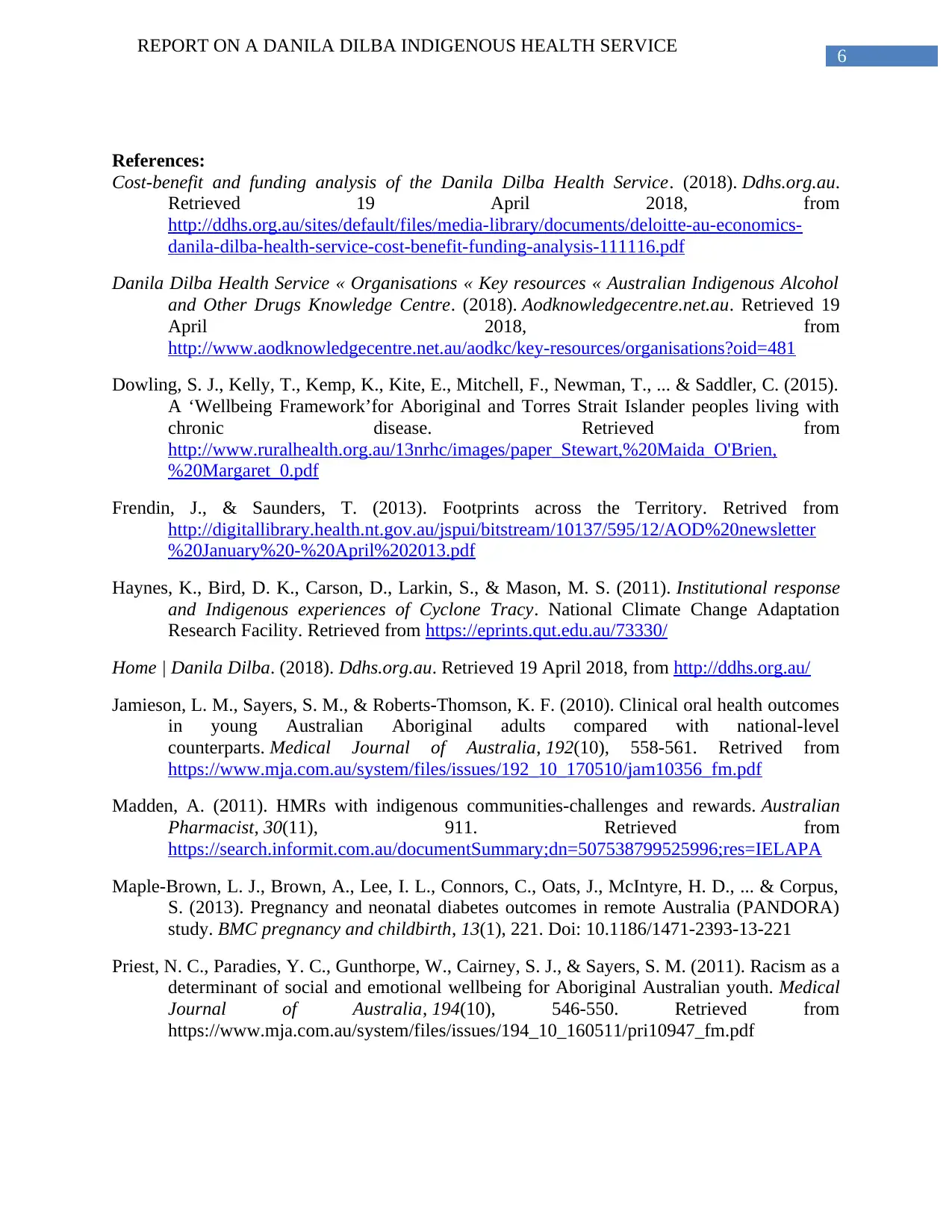
6
REPORT ON A DANILA DILBA INDIGENOUS HEALTH SERVICE
References:
Cost-benefit and funding analysis of the Danila Dilba Health Service. (2018). Ddhs.org.au.
Retrieved 19 April 2018, from
http://ddhs.org.au/sites/default/files/media-library/documents/deloitte-au-economics-
danila-dilba-health-service-cost-benefit-funding-analysis-111116.pdf
Danila Dilba Health Service « Organisations « Key resources « Australian Indigenous Alcohol
and Other Drugs Knowledge Centre. (2018). Aodknowledgecentre.net.au. Retrieved 19
April 2018, from
http://www.aodknowledgecentre.net.au/aodkc/key-resources/organisations?oid=481
Dowling, S. J., Kelly, T., Kemp, K., Kite, E., Mitchell, F., Newman, T., ... & Saddler, C. (2015).
A ‘Wellbeing Framework’for Aboriginal and Torres Strait Islander peoples living with
chronic disease. Retrieved from
http://www.ruralhealth.org.au/13nrhc/images/paper_Stewart,%20Maida_O'Brien,
%20Margaret_0.pdf
Frendin, J., & Saunders, T. (2013). Footprints across the Territory. Retrived from
http://digitallibrary.health.nt.gov.au/jspui/bitstream/10137/595/12/AOD%20newsletter
%20January%20-%20April%202013.pdf
Haynes, K., Bird, D. K., Carson, D., Larkin, S., & Mason, M. S. (2011). Institutional response
and Indigenous experiences of Cyclone Tracy. National Climate Change Adaptation
Research Facility. Retrieved from https://eprints.qut.edu.au/73330/
Home | Danila Dilba. (2018). Ddhs.org.au. Retrieved 19 April 2018, from http://ddhs.org.au/
Jamieson, L. M., Sayers, S. M., & Roberts-Thomson, K. F. (2010). Clinical oral health outcomes
in young Australian Aboriginal adults compared with national-level
counterparts. Medical Journal of Australia, 192(10), 558-561. Retrived from
https://www.mja.com.au/system/files/issues/192_10_170510/jam10356_fm.pdf
Madden, A. (2011). HMRs with indigenous communities-challenges and rewards. Australian
Pharmacist, 30(11), 911. Retrieved from
https://search.informit.com.au/documentSummary;dn=507538799525996;res=IELAPA
Maple-Brown, L. J., Brown, A., Lee, I. L., Connors, C., Oats, J., McIntyre, H. D., ... & Corpus,
S. (2013). Pregnancy and neonatal diabetes outcomes in remote Australia (PANDORA)
study. BMC pregnancy and childbirth, 13(1), 221. Doi: 10.1186/1471-2393-13-221
Priest, N. C., Paradies, Y. C., Gunthorpe, W., Cairney, S. J., & Sayers, S. M. (2011). Racism as a
determinant of social and emotional wellbeing for Aboriginal Australian youth. Medical
Journal of Australia, 194(10), 546-550. Retrieved from
https://www.mja.com.au/system/files/issues/194_10_160511/pri10947_fm.pdf
REPORT ON A DANILA DILBA INDIGENOUS HEALTH SERVICE
References:
Cost-benefit and funding analysis of the Danila Dilba Health Service. (2018). Ddhs.org.au.
Retrieved 19 April 2018, from
http://ddhs.org.au/sites/default/files/media-library/documents/deloitte-au-economics-
danila-dilba-health-service-cost-benefit-funding-analysis-111116.pdf
Danila Dilba Health Service « Organisations « Key resources « Australian Indigenous Alcohol
and Other Drugs Knowledge Centre. (2018). Aodknowledgecentre.net.au. Retrieved 19
April 2018, from
http://www.aodknowledgecentre.net.au/aodkc/key-resources/organisations?oid=481
Dowling, S. J., Kelly, T., Kemp, K., Kite, E., Mitchell, F., Newman, T., ... & Saddler, C. (2015).
A ‘Wellbeing Framework’for Aboriginal and Torres Strait Islander peoples living with
chronic disease. Retrieved from
http://www.ruralhealth.org.au/13nrhc/images/paper_Stewart,%20Maida_O'Brien,
%20Margaret_0.pdf
Frendin, J., & Saunders, T. (2013). Footprints across the Territory. Retrived from
http://digitallibrary.health.nt.gov.au/jspui/bitstream/10137/595/12/AOD%20newsletter
%20January%20-%20April%202013.pdf
Haynes, K., Bird, D. K., Carson, D., Larkin, S., & Mason, M. S. (2011). Institutional response
and Indigenous experiences of Cyclone Tracy. National Climate Change Adaptation
Research Facility. Retrieved from https://eprints.qut.edu.au/73330/
Home | Danila Dilba. (2018). Ddhs.org.au. Retrieved 19 April 2018, from http://ddhs.org.au/
Jamieson, L. M., Sayers, S. M., & Roberts-Thomson, K. F. (2010). Clinical oral health outcomes
in young Australian Aboriginal adults compared with national-level
counterparts. Medical Journal of Australia, 192(10), 558-561. Retrived from
https://www.mja.com.au/system/files/issues/192_10_170510/jam10356_fm.pdf
Madden, A. (2011). HMRs with indigenous communities-challenges and rewards. Australian
Pharmacist, 30(11), 911. Retrieved from
https://search.informit.com.au/documentSummary;dn=507538799525996;res=IELAPA
Maple-Brown, L. J., Brown, A., Lee, I. L., Connors, C., Oats, J., McIntyre, H. D., ... & Corpus,
S. (2013). Pregnancy and neonatal diabetes outcomes in remote Australia (PANDORA)
study. BMC pregnancy and childbirth, 13(1), 221. Doi: 10.1186/1471-2393-13-221
Priest, N. C., Paradies, Y. C., Gunthorpe, W., Cairney, S. J., & Sayers, S. M. (2011). Racism as a
determinant of social and emotional wellbeing for Aboriginal Australian youth. Medical
Journal of Australia, 194(10), 546-550. Retrieved from
https://www.mja.com.au/system/files/issues/194_10_160511/pri10947_fm.pdf
Paraphrase This Document
Need a fresh take? Get an instant paraphrase of this document with our AI Paraphraser
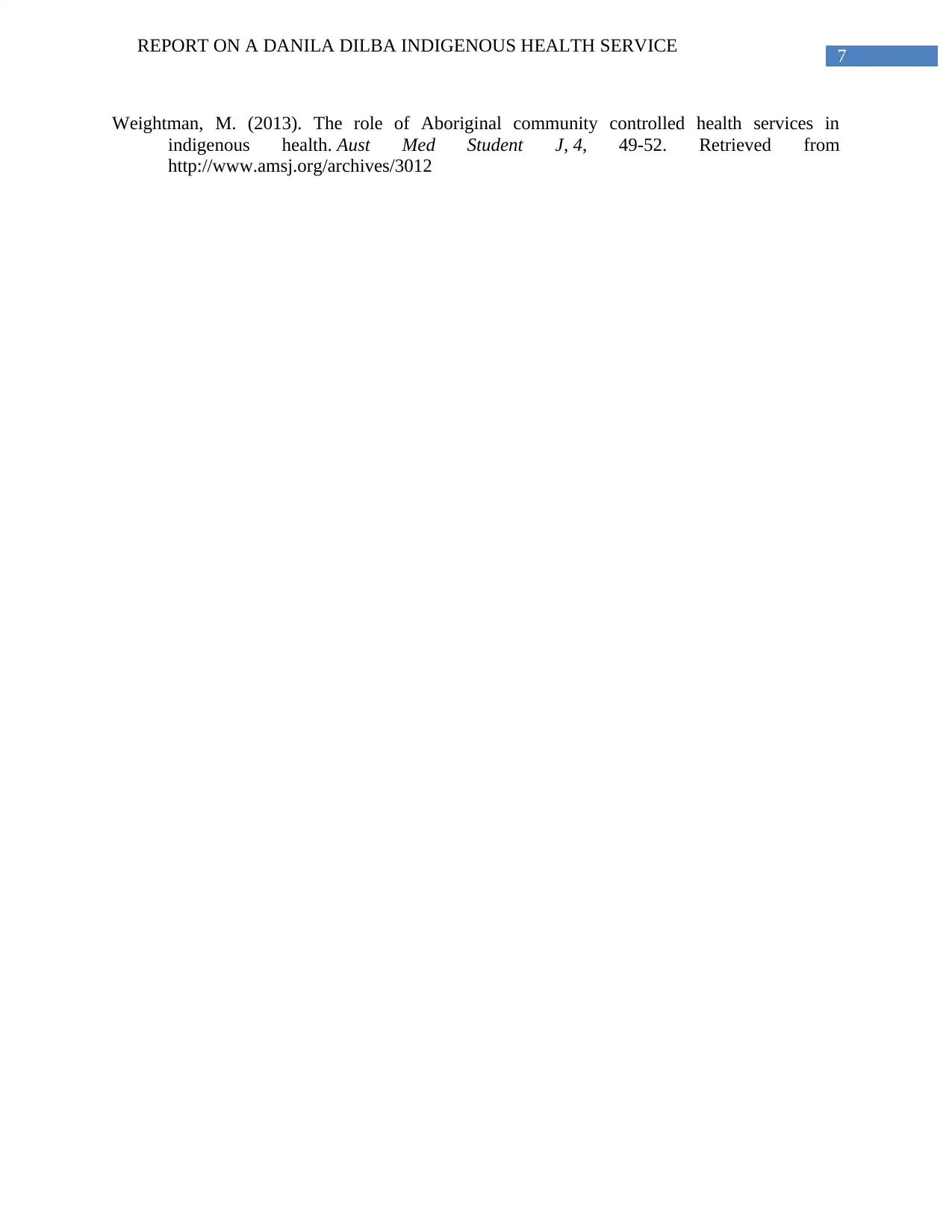
7
REPORT ON A DANILA DILBA INDIGENOUS HEALTH SERVICE
Weightman, M. (2013). The role of Aboriginal community controlled health services in
indigenous health. Aust Med Student J, 4, 49-52. Retrieved from
http://www.amsj.org/archives/3012
REPORT ON A DANILA DILBA INDIGENOUS HEALTH SERVICE
Weightman, M. (2013). The role of Aboriginal community controlled health services in
indigenous health. Aust Med Student J, 4, 49-52. Retrieved from
http://www.amsj.org/archives/3012
1 out of 8
Related Documents
Your All-in-One AI-Powered Toolkit for Academic Success.
+13062052269
info@desklib.com
Available 24*7 on WhatsApp / Email
![[object Object]](/_next/static/media/star-bottom.7253800d.svg)
Unlock your academic potential
Copyright © 2020–2025 A2Z Services. All Rights Reserved. Developed and managed by ZUCOL.





